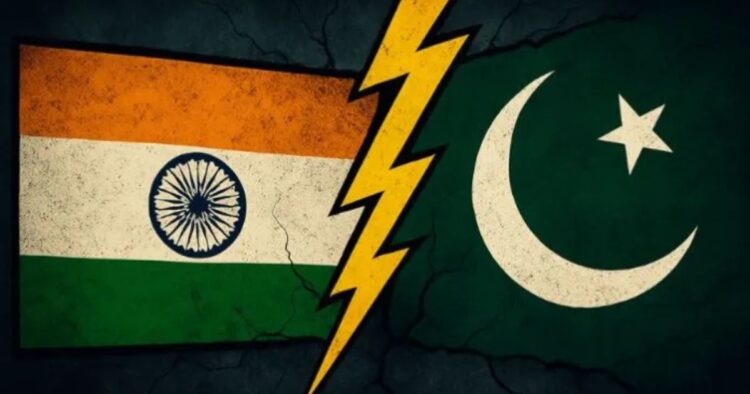KEY POINTS
- India and Pakistan agreed to stop fighting after the Pahalgam terror attack
- U.S. President Trump claimed the U.S. helped broker the ceasefire,
- Pakistan violated the ceasefire by launching drones and attacks across the LoC
India and Pakistan agreed to stop all fighting immediately on Saturday after tensions had risen sharply. This came after the terror attack in Pahalgam on 22nd April, where 26 Hindus were killed. In response, India launched “Operation Sindoor” on 7th May, targeting terrorist camps in Pakistan and Pakistan-occupied Jammu and Kashmir (PoJK). Pakistan then hit back using drones and missiles.
While U.S. President Donald Trump claimed that the United States helped arrange the ceasefire, India made it clear that the agreement was reached only after Pakistan’s top army officer (DGMO) called India’s DGMO to ask for a ceasefire. However, soon after the ceasefire was announced, Pakistan broke the agreement and launched fresh attacks across the Line of Control (LoC).
U.S. Claims Credit for India-Pakistan Ceasefire Deal Amid Renewed Tensions
U.S. President Donald Trump said that the United States helped bring about the ceasefire between India and Pakistan. According to reports in Western media, the U.S. played an important role in getting both countries to agree to stop the fighting.
Sources say that Vice President JD Vance called Indian Prime Minister Narendra Modi on Friday around noon U.S. time. He asked India to agree to a ceasefire because the ongoing fighting could lead to a serious and dangerous situation. Before making the call, Vance shared this information with President Trump, and both agreed that stopping the conflict was important.
They then urged both India and Pakistan to look for peaceful ways to reduce tension.
Omar Abdullah Slams Ceasefire Deal as Explosions Rock Border Regions
After the ceasefire was announced, Omar Abdullah, the Chief Minister of Jammu and Kashmir, shared a video on social media and questioned whether the ceasefire was actually holding. He raised concerns when loud explosions were heard in Srinagar. In a post on X, he wrote, “What just happened to the ceasefire? Explosions are heard all over Srinagar!!! This is not a ceasefire. The air defence units in the middle of Srinagar just fired.”
Drones and Explosions Return as Pakistan Breaks Ceasefire
Even though the ceasefire was agreed upon, sirens were heard in Srinagar and Udhampur as Pakistan kept sending drones into Indian airspace. Explosions were also heard in several border states, showing that Pakistan continued its attacks despite the agreement.
Blackouts Imposed in Border Areas as Tensions Rise
After Pakistan launched another round of attacks, authorities in Jammu and Kashmir, Punjab, and Rajasthan decided to enforce blackouts as a safety measure.
Indian Forces Foil Intrusion Attempt at Nagrota
A suspected intrusion attempt was stopped at the Nagrota Military Station, leading to a brief exchange of gunfire. The Army’s White Knight Corps confirmed that a soldier was injured but the injury was minor. A search operation was then started to find the intruder(s).
Foreign Secretary Misri Holds Pakistan Accountable for Ceasefire Violation
In a statement, Foreign Secretary Vikram Misri strongly condemned the ceasefire violation. He said, “This attack is unacceptable, and Pakistan is to blame for it. The Indian Army is responding and handling this border issue.” He also urged Pakistan to take immediate action to correct the situation.
China Urges Regional Stability, Reaffirms Support for Pakistan
Chinese Foreign Minister Wang Yi reportedly spoke to India’s National Security Advisor, Ajit Doval. According to the Chinese Foreign Ministry, Doval told them that the Pahalgam terror attack had caused heavy Indian casualties, leading India to take counter-terrorism action. He also made it clear that India did not want war and that both countries were focused on bringing back peace and stability in the region. In its statement, China said it would continue to support Pakistan during the rising tensions with India.
Jaishankar Reaffirms India’s Zero Tolerance for Terrorism
In a statement, External Affairs Minister Dr. S. Jaishankar confirmed that India and Pakistan had agreed to stop firing and military action. However, he emphasized India’s strong stance against terrorism, saying, “Our commitment against terrorism in all forms remains uncompromising.” This statement was made before Pakistan violated the ceasefire.
India Orders Armed Forces to Respond Strongly Amid Rising Tensions
After the ceasefire violation, the Indian government ordered its armed forces to respond strongly to any more attacks along the Line of Control (LoC) and international border to ensure the country’s safety.
Amritsar on Red Alert as Border Areas Stay Calm Overnight
On the morning of 11th May, Amritsar was placed under red alert, and district officials advised people to stay indoors because of increased security concerns. However, the situation in Jammu, Poonch, and other border areas remained calm in the morning.
Before the ceasefire violation, India had announced that another round of talks between the Director Generals of Military Operations (DGMO) from both countries would take place on 12th May. But it is unclear whether the talks will happen after the ceasefire breach.

















Comments